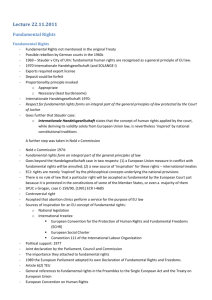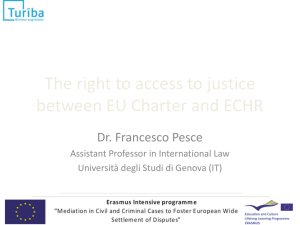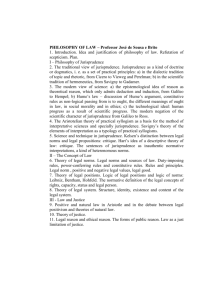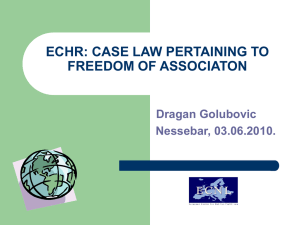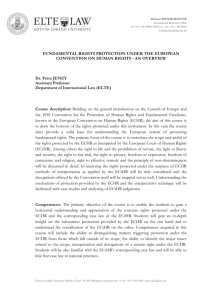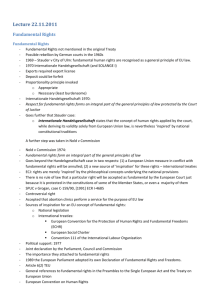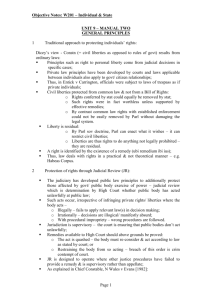Newsletter n.13 - Europeanrights.eu
advertisement
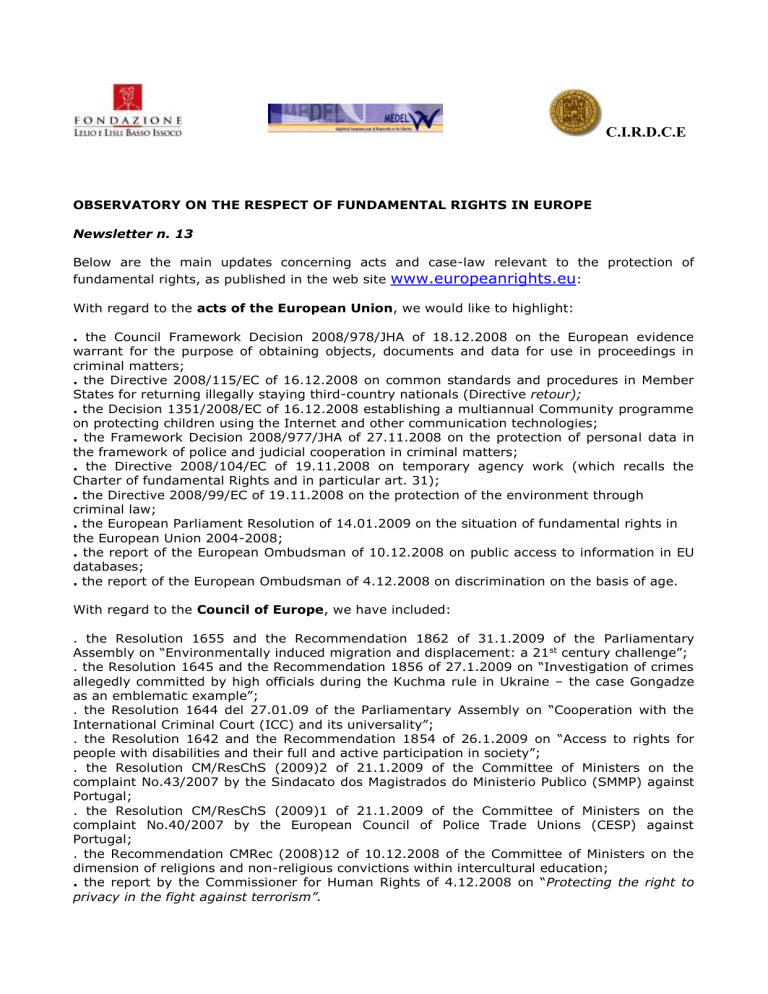
C.I.R.D.C.E OBSERVATORY ON THE RESPECT OF FUNDAMENTAL RIGHTS IN EUROPE Newsletter n. 13 Below are the main updates concerning acts and case-law relevant to the protection of fundamental rights, as published in the web site www.europeanrights.eu: With regard to the acts of the European Union, we would like to highlight: . the Council Framework Decision 2008/978/JHA of 18.12.2008 on the European evidence warrant for the purpose of obtaining objects, documents and data for use in proceedings in criminal matters; . the Directive 2008/115/EC of 16.12.2008 on common standards and procedures in Member States for returning illegally staying third-country nationals (Directive retour); . the Decision 1351/2008/EC of 16.12.2008 establishing a multiannual Community programme on protecting children using the Internet and other communication technologies; . the Framework Decision 2008/977/JHA of 27.11.2008 on the protection of personal data in the framework of police and judicial cooperation in criminal matters; . the Directive 2008/104/EC of 19.11.2008 on temporary agency work (which recalls the Charter of fundamental Rights and in particular art. 31); . the Directive 2008/99/EC of 19.11.2008 on the protection of the environment through criminal law; . the European Parliament Resolution of 14.01.2009 on the situation of fundamental rights in the European Union 2004-2008; . the report of the European Ombudsman of 10.12.2008 on public access to information in EU databases; . the report of the European Ombudsman of 4.12.2008 on discrimination on the basis of age. With regard to the Council of Europe, we have included: . the Resolution 1655 and the Recommendation 1862 of 31.1.2009 of the Parliamentary Assembly on “Environmentally induced migration and displacement: a 21 st century challenge”; . the Resolution 1645 and the Recommendation 1856 of 27.1.2009 on “Investigation of crimes allegedly committed by high officials during the Kuchma rule in Ukraine – the case Gongadze as an emblematic example”; . the Resolution 1644 del 27.01.09 of the Parliamentary Assembly on “Cooperation with the International Criminal Court (ICC) and its universality”; . the Resolution 1642 and the Recommendation 1854 of 26.1.2009 on “Access to rights for people with disabilities and their full and active participation in society”; . the Resolution CM/ResChS (2009)2 of 21.1.2009 of the Committee of Ministers on the complaint No.43/2007 by the Sindacato dos Magistrados do Ministerio Publico (SMMP) against Portugal; . the Resolution CM/ResChS (2009)1 of 21.1.2009 of the Committee of Ministers on the complaint No.40/2007 by the European Council of Police Trade Unions (CESP) against Portugal; . the Recommendation CMRec (2008)12 of 10.12.2008 of the Committee of Ministers on the dimension of religions and non-religious convictions within intercultural education; . the report by the Commissioner for Human Rights of 4.12.2008 on “Protecting the right to privacy in the fight against terrorism”. With regard to case law, we would like to highlight: With regard to the Court of Justice, the decisions: . of 22.12.2008, C-491/07, Vladimir Turanský, on the principle of ne bis in idem; . of 18.12.2008, C-349/07, Sopropé - Organizações de Calçado Lda, on the respect of the rights of defence in case of subsequent recovery of import customs duties; . of 18.12.2008, C-306/07, Ruben Andersen, in the matter of information of workers and collective labour agreement; . of 16.12.2008, C-524/06, Heinz Huber, on the protection of personal data and the prohibition of discrimination for nationality reasons; . of 16.12.2008, C-127/07, Société Arcelor Atlantique et Lorraine and others, in the matter of environment; . of 16.12.2008, C-73/07, Tietosuojavaltuutettu, on the protection of personal data; . of 11.12.2008, C-297/07, Bourquain, on the principle of ne bis in idem; . of 25.11.2008, C-455/06, Heemskerk and Schaap, on the national rule prohibiting the reformatio in peius; And also . the decision of the Court of first instance of 4.12.2008, T-284/08, People’s Mojahedin Organization of Iran, concerning the black list. With regard to the European Court of Human Rights, the decisions: . Zolotukhin vs Russia (n.14939/03) of 10.2.2009, in which the Court analyses the notion of “same fact” with regard to the prohibition of the bis in idem provided by art.4 of the Protocol n.7, accepting the thesis that there can be identity of facts independently from their juridical qualification, and that there can be essential elements common to different crimes; . Women on Waves and others vs Portugal (n.31276/05) of 4.2.2009, with which the Court has stated that the decision of the Portuguese authorities to deny the access to its territorial waters to the ship “Borndiep”, which is linked to promotion activities for the decriminalization of abortion, is a violation to the right to freedom of expression; . Serie Yiğit vs Turkey (n.3976/05) of 20.1.2009, with which the Court has stated that the refusal to recognize, in favour of the claimant, the social rights benefit of the deceased partner, whom he had married with religious ceremony, was not a violation to the right to private and family life; . Güveç vs Turkey (n.70337/01) of 20.1.2009, with which the Court has unanimously considered a violation to the prohibition of inhuman or degrading treatments the fact that the claimant, who at the time was fifteen years old, had been detained in a prison for adults; . Kokkelvisserij vs Holland (n.13645/05), of 20.1.2009, with which the Court has deemed as unreceivable the claim of a Dutch association, that complained for not having had the possibility of illustrating a defensive act after the conclusions of the Advocate General in a trial before the European Community’s Court of Justice, concerning the interpretation of a Community law. Since the claimant, according to the Dutch legal system, could still assert its rights in the principal trial, the guarantees of the fair trial were to be considered still intact; . Zara vs Italy (n.24424/03) of 20.1.2009, with which the Court has stated the violation of art. 8 of the ECHR, because the claimant, who was detained according to art.41bis of the Italian penitentiary law and subjected to the control of the correspondence, complained that a letter, addressed to his lawyer, who represented him before the European Court, had been opened; . Association of citizens “Radko” and Paunkovski vs “the Former Yugoslavian Republic of Macedonia” (n.74651/01) of 15.1.2009, with which the Court has considered as a violation of art.11 of the ECHR the dissolution of the claiming association for unconstitutionality and instigation to hate and to national and religious intolerance; . Bourdov vs Russia (n.33509) of 15.1.2009, the first “pilot” decision against Russia on non execution or delay on execution of national definitive decisions; . Reklos and Davourlis vs Greece (n.1234/05) of 15.1.2009, with which the Court has unanimously stated the violation of articles 6 and 8 of the ECHR for the turning down of the claims lodged by two parents before the Greek judicial authorities to complain for the use of photographs of their new born baby without their consent; . Orban and others vs France (n.20985/05) of 15.1.2009, with which the Court has stated the violation of article 10 of the ECHR, with regard to the decision which sentenced the claimants for apology of war crimes after the publication of the book “Services Speciaux Algérie 19551957”; . Todorova vs Italy (n.33932/06) of 13.1.2009, with which the Court has stated the violation of art.8 of the ECHR with regard to the Italian judges’ decision of adoptability concerning the claimant’s twin daughters, pronounced 27 days after their birth, subsequently to the claimant’s initial consent, but without allowing her to give evidence of a different decision; . TV Vest AS and Rogaland Pensionistparti vs Norway (n.21132/05) of 11.12.2008, with which the Court has stated the violation of art.10 of the ECHR for the fine to the TV Vest for not having respected the prohibition of showing on television advertising of political nature; . Dzieciak vs Poland (n. 77766/01) of 9.12.2008, with which the Court has stated the violation of art.2 of the ECHR because Polish authorities have not guaranteed sufficient treatments in favour of the claimant during the four years spent in preventative detention and they did not carry out an adequate enquiry; . S. and Marper vs the United Kingdom (n.30562/04 e 30566/04) of 4.12.2008, with which the Grand Chamber has stated the violation of art.8 of the ECHR with regard to the British authorities’ conservation of finger prints, cellular samples and DNA profile after the conclusion, respectively with acquittal and discontinuance, of the criminal proceedings against the claimants; . Zuppala vs Finland (n.18620/03) of 2.12.2008, in the matter of slander; . K.U vs Finland (n.2872/02) of 2.12.2008, with which the Court has stated the violation of art.8 of the ECHR because the Finnish authorities have not adequately protected the right of the child to the respect of private and family life with regard to a sexual advertisement appeared in his name in a web site for meeting people via internet. With regard to the extra-European area, we have included: . the decision of the inter-American Court of Human Rights of 27.11.2008 Ticona Estrada vs. Bolivia in the matter of forced disappearance of people and consequences deriving for the States from such crimes; . the decision of the inter-American Court of Human Rights of 30.10.2008 Bayarri vs. Argentina on the notion of fair trial (which also recalls the norms of the ECHR); . the decision of the Supreme Court of Connecticut of 28.10.2008 favourable to marriages between homosexuals; . the decision of the Supreme Court of Georgia (USA) of 27.10.2008, which establishes the unconstitutionality of the State’s law on sexual crimes if applied to homeless people, who cannot register, as provided, with a new address; . the decision of the Supreme Court of Israel of 11.6.2008 on the juridical regime of fighters in the Gaza strip; . the report of 18.12.2008 of the U.S. Department of Homeland Security on the PNR information (Passenger name record, personal data of passengers of flights) concerning the US-EU flights; . the report of October 2008 by the Harvard law school “Models for protecting the environment for the future generations” which lays basis and finds juridical mechanisms for an immediate protection of the environment at an international level. With regard to national jurisprudences we would like to recall: For Austria, the decision of the Verfassungsgerichtshof Oesterreich of 24.9.2008, with which the Austrian Federal Constitutional Court deems the observance to the Constitution and Community law of the national law on the agreement between a lawyer and his client about contingent fees; For Belgium, the decisions of the Constitutional Court of 3.12.2008, which considers illegitimate art. 4 of the law 16 November 1972, concerning labour inspections, for incompatibility with the right to the respect of private and family life; of 6.11.2008, which judges on the legitimacy of some articles of the law of 21 April 2007, on internment of people affected by mental illnesses, applying the norms of the ECHR and the jurisprudence of the Court of Strasbourg; of 30.10.2008, which analyses article 51 of the law of 27 June 1996 of the Walloon Region, in the matter of waste material, in the light of the principle of legality in the criminal field; and of 22.10.2008 concerning the compatibility of chapters III and IV of the law of 26 March 2007, on the extension of compulsory health insurance for “minor risks” to self-employed people, with the norms of the First Protocol to the ECHR and Community law; For France, the decision of the Council of State of 17.10.2008, which judges on the legitimacy of the law 2006-338 of 21 March 2006, that modifies the criminal procedure code with regard to the norms on isolation of prisoners, in the light of the norms of the ECHR, the International Covenant on Civil and Political Rights and the Convention of New York on the rights of the child; For Germany, the decision of the Bundesverfassungsgericht of 10.11.08, which examines the constitutionality and compatibility to the jurisprudence of the European Communities’ Court of Justice (on protection of the consumer) of the norms on games and betting of the Land Rheinland Pfalz; For Great Britain, the decisions of the Asylum and Immigration Tribunal of 1.12.2008, which upholds the claim for asylum of a Somali citizen, because subjected to the risk of treatments in contrast with the principles provided by article 3 of the ECHR; of 30.10.2008, which judges on a deportation order issued against a citizen of the European Economic Area, also applying the norms of the ECHR; and of 13.10.2008 concerning the right to asylum, which deals with the question of the relation between detention and rights provided by article 3 of the ECHR, recalling widely the jurisprudence of the Court of Strasbourg; the decision of the High Court of 14.11.2008, in the matter of protection of health in the use of pesticides, that applies the ECHR and Community law; the decisions of the House of Lords of 26.11.2008, which analyses the obligation of national authorities to carry out enquiries, as positive obligation of protection deriving from article 2 of the ECHR, also applying the jurisprudence of the Court of Strasbourg; of 12.11.2008 concerning access to social security benefits, and more in general to the labour market, for citizens coming from European State Members of recent adhesion; and of 22.10.2008, which guarantees humanitarian protection to a Lebanese citizen and her child for the risk of violation of the rights provided by article 8 of the ECHR; For Ireland, the decisions of the High Court of 14.10.2008, which provides subsidiary protection to an Algerian citizen victim of torture in his Country; and of 11.11.2008, which judges on a case of discrimination based on age, also applying the norms of the ECHR and the jurisprudence of the Court of Strasbourg; For Latvia, the decision of the Satversmes tiesa (Constitutional Court) of 21.10.2008, in the matter of prisoners’ rights, that applies the “European Social Charter” and the “European Penitentiary Rules” issued by the Council of Europe, and mentions the jurisprudence of the Court of Strasbourg; For Portugal, the decision of the Constitutional Court of 19.11.2008 in the matter of fair trial and right of defence, which applies the norms of the ECHR; For the Czech Republic, the decision of the Constitutional Court of 26.11.2008, which considers compatible with the constitutional set-up of the State the norms of the Treaty of Lisbon and the European Union’s Charter of Fundamental Rights; For Slovenia, the decisions of the Constitutional Court of 11.9.2008, in the matter of protection of linguistic minorities, that mentions the European Charter of Regional or minority languages; and of 2.10.2008, which has considered in contrast with the right to privacy of communications the fact that, during a police operation, some data saved on a phone card was seized without any previous judicial authorization; For Spain, the decisions of the Supreme Court of 13.10.2008, in which the Court recognizes the violation of the rights provided by article 8 of the ECHR as a consequence of airplanes’ flight over a town; and, moreover, of 13.10.2008, which judges on a labour controversy applying Community law and the jurisprudence of the Court of Justice; the decision of the Constitutional Court of 20.10.2008, which judges on a presumed violation of the right to effective jurisdictional protection with regard to the right to physical and moral integrity, mentioning the jurisprudence of the Court of Strasbourg; the decision of the Court of Valladolid of 14.11.2008, which prohibits to expose the Crucifix in school classes, that recalls the Convention on the rights of the child and several decisions of the Court of Strasbourg; For Italy, the decisions of the Constitutional Court n.438 of 23.12.2008, which recalls the European Union’s Charter of Fundamental Rights with regard to the right to informed consent in the matter of medical treatments; n. 439 of 23.12.2008, which has stated the unconstitutionality of certain norms of the law of the autonomous Province of Bolzano in the matter of public services also in the light of the contrast with Community law and jurisprudence; n.411 of 17.12.2008, which has quashed certain norms of a law of the Sardinian Region in the matter of contracts because in contrast with Community law; the decisions of the Court of Cassation n. 28501 of 11.12.2008 in the matter of fair trial, which excludes the possibility to deny compensation for the exiguity of the delay in comparison with the parameters established by the Court of Strasbourg; n. 27310 of 17.11.2008 in the matter of refugees, which gives the national judge the task of contributing to the verification of the relevant facts in order to recognize the refugee status; n. 27224 of 14.11.2008, which establishes the illegitimacy of the denial of a visa for family rejoining, based on a mere report of the so-called “Schengen system”, if the real social dangerousness of the person is not verified, that recalls the jurisprudence of the Court of Justice; n. 36527 of 23.9.2008, which considers the benefit of pardon applicable also to sentences which are still being served in the State, on the base of the Convention of Strasbourg on the transfer of sentenced persons; the decision of the Council of State of 20.5.2008 in the matter of treatment of waste materials, that recalls Community law and jurisprudence in such matter; the order of the Administrative Regional Court of Campania of 29.10.2008, which has raised question of Constitutional legitimacy of certain norms concerning dispossession because in contrast with the ECHR and the jurisprudence of the Court of Human Rights; the order of the Court of Modena of 2.12.2008, which uses the jurisprudence of the Court of Justice in the matter of betting to disapply national norms. With regard to the comments, among the documents of European importance we have included Jean Paul Costa’s speech, “Speech on the occasion of the opening of the judicial year” of January 2009; the Reports by the European anti poverty network on poverty and social exclusion for the years 2008-2010; the Red Cross’ s document "Freedom, Security and Justice: What will be the future?" – Consultation on priorities of the European Union for the next five years (2010-2014) of November 2008; Dick Marty’s opinion as amicus curiae in the proceeding Khaled vs. USA before the American Supreme Court; the document of the Foundation of Dublin (by Voss, Eckhard; Wilke, Peter; Sobczak, André; Schömann, Isabelle) “Codes of conduct and international framework agreements: New forms of governance at company level”; the study by the French Court of Cassation of July 2008 “Freedom of expression and protection of personal rights in the matter of press. French and Community right”. Among the comments we have also included: Valentina Bazzocchi “The framework decision on the data protection in the third pillar” Vincenzo Carbone “Report on administration of justice in 2008” Roberto Conti “The European Parliament resolution on fundamental rights 2004-2008” Francesco Crisafulli “Conquests and traps of the possibility of protection of fundamental rights” Valerio De Luca “Discrimination and Roma people in Italy. The case of the orders of the President of the Council of Ministers on May 2008” Maurizio De Stefano “The forfeiture of lottings without planning permission in Italy under the examination of the European Court of Human Rights (the Punta Perotti case)” Elena Falletti “Consideration on protection of human rights in Mozambique and the role of the European Union for their promotion in the developing Countries” Giovanni Maria Flick “Final considerations on constitutional jurisprudence of 2008” Fabio Licata “The Court of Cassation finds the way to reopen proceedings after a sentence for violation of the principle of fair trial” Teresa Magno “Reflection on the implementation of the European arrest warrant in Italy” Alberto Marcheselli “The right to adversarial procedure in administrative taxation proceedings is a fundamental right of the Community legal system” Chiara Meoli “The Lobbying in the European Union” Vito Monetti “Independence of the judiciary as International value” Grazia Neglia “Rape as war gun. Comment to the UN’s Resolution” Laura Nissolino “The Treaty of Lisbon and access to justice” Chiara Noto “Right to competition: fair trial and effectiveness of enquiries” Massimo Pallini “Protection of the public social order as limit to freedom of services’ circulation in the EU’s market” Laura Pennacchi “Labour, constitutionalization of the person, economic institutions” Antoni Pigrau Solé “The American Convention on Human Rights and the Court of San José of Costa Rica” Daniel Raventòs “60 years of human rights and one of the declaration of Monterrey” Sylvia Steiner “The special protection of women in the statute of Rome”

